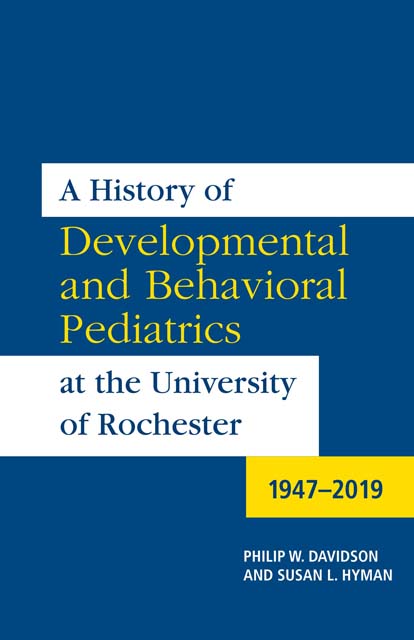Book contents
- Frontmatter
- Dedication
- Contents
- Foreword
- Preface
- Epigraph
- Chapter One Historical Context
- Chapter Two Laying a Foundation
- Chapter Three Opportunities
- Chapter Four Changing of the Guard
- Chapter Five Emergence of Focus
- Chapter Six Team Building
- Chapter Seven Maturation
- Interlude: (Or Let Us Take A Break From Acronyms)
- Chapter Eight Expansion
- Chapter Nine Emergence of Research Programs
- Chapter Ten Change in the Wind
- Chapter Eleven Beyond Dreams
- Chapter Twelve DBP’s Clinical Program Expands
- Chapter Thirteen Dramatic Growth of Autism Research
- Chapter Fourteen Changing Relationships
- Epilogue
- Acknowledgments
- List of Abbreviations
- References
- About the Authors
Chapter Nine - Emergence of Research Programs
Published online by Cambridge University Press: 14 June 2023
- Frontmatter
- Dedication
- Contents
- Foreword
- Preface
- Epigraph
- Chapter One Historical Context
- Chapter Two Laying a Foundation
- Chapter Three Opportunities
- Chapter Four Changing of the Guard
- Chapter Five Emergence of Focus
- Chapter Six Team Building
- Chapter Seven Maturation
- Interlude: (Or Let Us Take A Break From Acronyms)
- Chapter Eight Expansion
- Chapter Nine Emergence of Research Programs
- Chapter Ten Change in the Wind
- Chapter Eleven Beyond Dreams
- Chapter Twelve DBP’s Clinical Program Expands
- Chapter Thirteen Dramatic Growth of Autism Research
- Chapter Fourteen Changing Relationships
- Epilogue
- Acknowledgments
- List of Abbreviations
- References
- About the Authors
Summary
I am convinced that an important stage of human thought will have been reached when the physiological and the psychological, the objective and the subjective, are actually united, when the tormenting conflicts or contradictions between my consciousness and my body will have been factually resolved or discarded.
— Ivan Pavlov, 1932, pp. 93–94During the 1990s and early 2000s, several research themes emerged, and resulted in substantial extramural funding.
Mercury and Child Development
In the 1950s, mass poisonings took place in Minamata and Niigata, Japan. Hundreds of people died after consuming fish contaminated by industrial runoff containing methylmercury (Harada, 1968). Children born to pregnant women who were exposed to the toxic effluent were born with severe IDD. About 10 years later, another poisoning took place in Iraq, also involving methylmercury exposure; but in Iraq the exposure was from seed grain coated with a fungicide containing methylmercury (Amin-Zaki et al., 1974). After the Iraq outbreak, a team of investigators from the University of Rochester led by Thomas W. Clarkson, PhD, and including neurologists David Marsh, MD, and Dr. Myers, evaluated prenatally exposed Iraqi children and published data suggesting that intellectual and developmental abnormalities could result from exposure to methylmercury in the range that could be achieved by consuming ocean fish. Drs. Clarkson, Marsh, and Myers, together with Conrad F. Shamlaye, MD, MPH, MEcon, from the Ministry of Health in the Republic of Seychelles initiated the Seychelles Child Development Study (SCDS) in 1985 to test the hypothesis that prenatal exposure to organic methylmercury (MeHg) from fish consumption could lead to adverse neurodevelopmental outcomes in the offspring of mothers who consumed fish. Dr. Davidson joined the study team in 1990 and succeeded Dr. Clarkson as Principal Investigator in 2006. The evidence amassed during the over 30-year duration of the SCDS has not supported the original hypothesis; the studies have demonstrated that the pathway between MeHg exposure and outcome is very complex and affected by nutrients in fish and genetic factors. The likely story is that potential methylmercury neurotoxicity is modified by antioxidants and antiinflammatory compounds found in a diet high in fish (Davidson et al., 1998; Davidson et al., 2008a; Myers et al., 2003; Strain et al., 2008). These results have led to much public policy discussion regarding fish consumption advisories issued by governments around the world (Kaiser, 1996).
- Type
- Chapter
- Information
- A History of Developmental and Behavioral Pediatrics at the University of Rochester1947-2019, pp. 63 - 70Publisher: Boydell & BrewerPrint publication year: 2021



